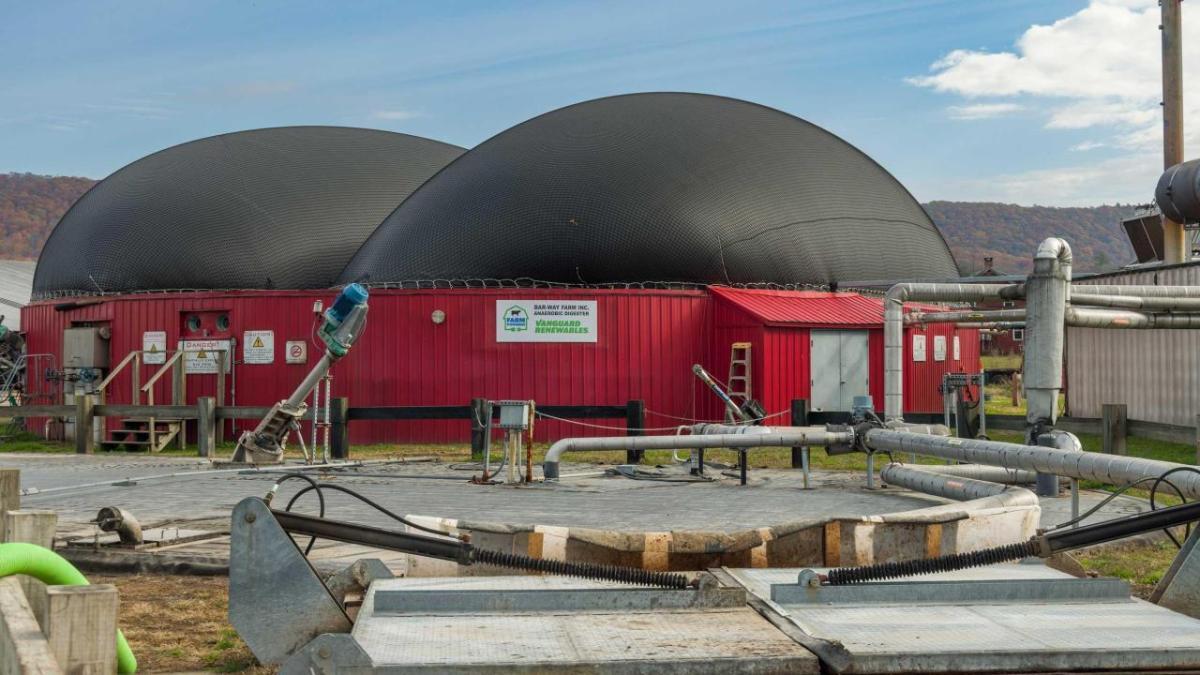
Demystifying Farm Powered® Anaerobic Digestion: Harnessing The Power Of Waste
How Does Farm Powered Anaerobic Digestion Work
Watch the fun explainer video above.
Waste is Only Waste if You Waste It
Food waste is a fact of life, whether it be in a home or at a factory. If a cookie manufacturer added baking powder instead of baking soda to their batter, that whole industrial batch of cookies would need to be discarded. That's a lot of cookies that can't be sent to feed those in need but would be sent to the landfill.
For dairy farmers, manure presents some smelly challenges. Like food waste, you can't have dairy cows without cow manure. There are several ways that farmers and food and beverage companies can handle their unavoidable waste. We believe that recycling them together through anaerobic digestion provides a sustainable solution for both dairy farmers and food and beverage manufacturers.
There are many benefits of recycling food waste and dairy cow manure through anaerobic digestion, creating positive impacts on waste management, renewable energy generation, greenhouse gas reduction, and sustainable agriculture.
Waste Management and Environmental Benefits
Food waste and dairy cow manure can present waste management challenges. When it comes to manure from dairy cows, The U.S.D.A. Natural Resources Conservation Service estimates“that the manure from 200 milking cows produces as much nitrogen as sewage from a community of 5,000 to 10,000 people.” While this manure is most commonly used as a beneficial source of nutrients for crops, inclusion of an anaerobic digester reduces emissions associated with manure storage and generates renewable energy.
Improper disposal of organic waste leads to harmful methane emissions, increased landfill volumes, and wasted resources. However, through anaerobic digestion, these organic materials can be efficiently converted into renewable energy and valuable byproducts such as a digestate that can be used as a low-carbon and nutrient dense fertilizer, and the solids which become bedding for the herd.
Biogas is a key product of anaerobic digestion, comprising primarily methane and carbon dioxide. By capturing and utilizing biogas as a renewable energy source, we can reduce reliance on fossil fuels, combat climate change, and lower greenhouse gas emissions. The methane recovered from organic waste is a potent greenhouse gas, and preventing its release through anaerobic digestion significantly mitigates its environmental impact.
Digestate, the liquid left after anaerobic digestion, is a nutrient-rich material that can be used as a fertilizer. Applying digestate to croplands replenishes soil nutrients, reduces the need for synthetic fertilizers, and promotes regenerative agriculture practices. This approach minimizes waste and contributes to a circular economy, enhancing overall resource efficiency.
Renewable Energy Generation
RNG can be combusted in engines or turbines to produce electricity, which can be utilized on-site or fed into the power grid. This renewable energy source can power homes, businesses, and even entire communities, reducing the dependence on fossil fuel-based electricity.
It can also be used for heat production in industrial processes, space heating, or water heating. By displacing conventional natural fossil heating fuels with RNG, we can reduce the carbon footprint of these applications, contributing to a more sustainable energy mix.
Recently, AstraZeneca and Vanguard Renewables entered a transformative partnership to fuel all their U.S. operations in the U.S. by 2026. Waste Dive has referred to the partnership as the“largest open market RNG deal yet.” This is a game changer for companies that are trying to reach their net zero carbon targets, by decarbonizing their thermal load.
RNG can also be upgraded to biomethane, a renewable natural gas, which can be used as a low-carbon fuel for vehicles. This presents an opportunity to decarbonize transportation and reduce greenhouse gas emissions in the transportation sector.
Agricultural Sustainability and Nutrient Management
Dairy cow manure can be effectively managed through anaerobic digestion. Anaerobic digestion helps mitigate the environmental impact of manure by reducing methane emissions and minimizing odor issues. It also provides a means to manage the nutrient content of the manure more effectively.
Digestate, the nutrient-rich byproduct of anaerobic digestion, can be applied to cropland as a fertilizer, replenishing soil nutrients and improving soil health. This promotes sustainable agriculture practices, reduces the need for synthetic fertilizers, and minimizes nutrient runoff, which can pollute water bodies. The digestate can be another source of cost savings for our farmers since they no longer have to rely on traditional fertilizers. Many of Vanguard's host farms have seen an increase in crop yields, and they believe it is from the use of the digestate.
By recycling dairy cow manure through anaerobic digestion, farmers can enhance nutrient management, improve soil fertility, and reduce the environmental impact associated with traditional manure management practices.
Additionally, the solids that come from the pressing of the digestate can be used as bedding for the farmer's herd, which is yet another cost savings for host farms.
Final Thoughts
Anaerobic digestion is a valuable solution for recycling food waste and dairy cow manure, turning these organic materials into renewable natural gas and nutrient-rich by-products. The benefits are far-reaching, encompassing waste management, renewable energy generation, greenhouse gas reduction, economic advantages, and agricultural sustainability. By adopting anaerobic digestion systems, we can contribute to a more sustainable future, where waste is minimized, renewable energy sources are embraced, and agriculture operates in harmony with the environment. It is crucial for stakeholders, including food producers, dairy farmers, waste management entities, and policymakers, to collaborate and invest in anaerobic digestion infrastructure to harness the full potential of these organic waste streams.
About Vanguard Renewables
Vanguard Renewables, based in Weston, Massachusetts, is a national leader in developing food and dairy waste-to-renewable energy projects. The Company owns and operates on-farm anaerobic digester facilities in the northeast and currently operates manure-only digesters in the south and west for Dominion Energy. Vanguard Renewables plans to expand nationwide to more than 150 anaerobic digestion facilities by 2026. Vanguard Renewables is committed to advancing decarbonization by reducing greenhouse gas emissions from farms and food waste, generating renewable energy, and supporting regenerative agriculture on partner farms via Farm Powered® anaerobic digestion. Vanguard Renewables is a portfolio company of BlackRock Real Assets.

Legal Disclaimer:
MENAFN provides the
information “as is” without warranty of any kind. We do not accept
any responsibility or liability for the accuracy, content, images,
videos, licenses, completeness, legality, or reliability of the information
contained in this article. If you have any complaints or copyright
issues related to this article, kindly contact the provider above.


















Comments
No comment